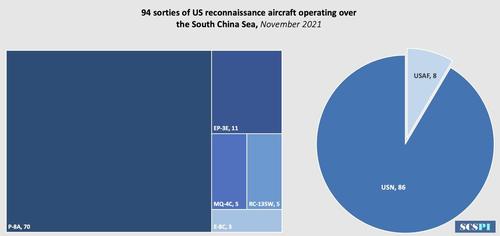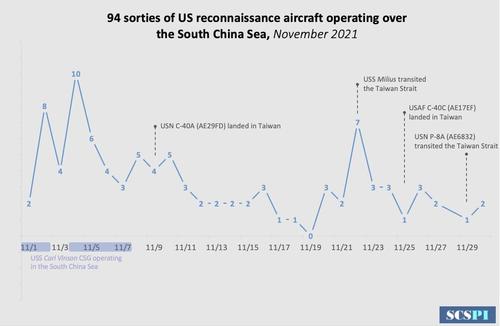US Spy Planes Conducted Record Number Of Missions Near China, Beijing Think-Tank Says
Reconnaissance aircraft operated by the USAF carried out a record number of flights over the South China Sea in November, according to data compiled by a Beijing-based think tank.
The South China Sea Strategic Situation Probing Initiative (SCSPI) said U.S. spy planes carried out 94 sorties last month, a 25% increase from the February record of 75 flights. The think tank reported 80% of the flights were conducted by P-8A anti-submarine patrol aircraft, and the rest were MQ-4C surveillance drones and 8C air-to-ground surveillance aircraft.
SCSPI's data shows the most move active day was on Nov. 04, when the U.S. deployed ten spy planes across the region. The same day, the USS Carl Vinson aircraft carrier strike group sailed through the South China Sea.
A Navy P-8A anti-submarine patrol aircraft flew over the Taiwan Strait on Nov. 29, an area where Beijing continues to unleash wave after wave of warplanes into Taiwan's defense identification zone. The spy plane "was only about 15.91 nautical miles [29.46km] from the baseline of the Chinese mainland's territorial waters," the SCSPI report said, adding that the aircraft may have had their transponder turned off.
Last year, Beijing blasted the U.S. for concealing spy planes' identities as commercial passenger planes. They said it's common for USAF spy planes to impersonate the transponder code of civilian aircraft from other countries -- calling it dangerous.
At the time, SCSPI said, "this undoubtedly added up to great risk and uncertainty to international flight safety, which could lead to misjudgment (by ground air defense systems) and probably bring danger to civilian aircraft especially those being impersonated."
Bloomberg spoke with a spokesperson for the U.S. 7th Fleet who said, "U.S. Navy ships and aircraft routinely operate within the international waters of the South China Sea, and are committed to supporting its network of alliances and partners and upholding a free and open Indo- Pacific."
On Friday, Chinese Foreign Ministry spokesman Zhao Lijian urged the U.S. to stop "severely infringing on China's territorial security." He said, "this is aimed at creating tensions and will drive the risk of regional conflict."
The last thing the U.S. and China need is a major foreign policy crisis. President Biden and President Xi Jinping don't want conflict ahead of the 2022 Winter Olympics in Beijing and ahead of next year's 20th Party Congress in China and the U.S. midterm elections.
https://ift.tt/3IjmFBB
from ZeroHedge News https://ift.tt/3IjmFBB
via IFTTT






0 comments
Post a Comment